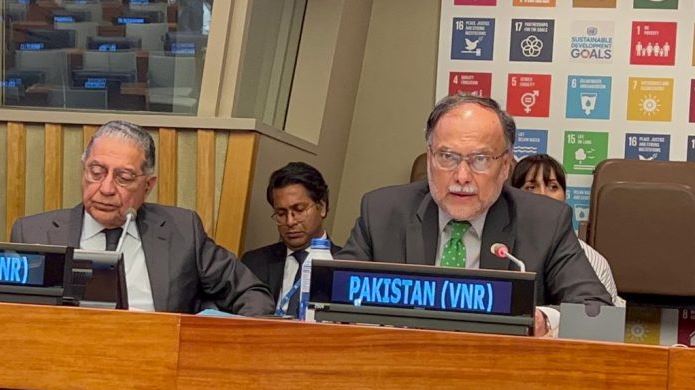NEW YORK, Jul 16 (TNS):Minister for Planning, Development and Special Initiatives Ahsan Iqbal Friday presented the Voluntary National Review (VNR) of Pakistan at the 15th meeting of ministerial segment of Economic and Social Council (ECOSOC 2022) at the United Nations.
While presenting the VNR, the minister said Pakistan was a resilient nation. “We are a nation of young people. 64 percent of population are below the age of 30. Youth of Pakistan need good and quality education, and skills to achieve sustainable development for a better Pakistan.”
He said despite having formidable global and national challenges, Pakistan followed its development plans in partnership with the international community and local stakeholders.
Ahsan Iqbal presents Voluntary National Review of Pakistan at UNECOSOC
“This year’s VNR report contains localisation efforts and innovation in partnership with other different stakeholders, response and recovery from COVID and way forward in the light of lessons learnt to build better in the decade of action.”
Ahsan Iqbal presented the Vision 2025 alignment with the Social Development Goals. He said the SDGs were strategically aligned with the National Vision 2025. “Each pillar is uniquely associated with different Sustainable Development Goals (SDGs).”
On the policy enabling environment, he said the SDGs were adopted as a national development agenda through a unanimous National Assembly resolution in 2016.
“Soon after, we have established specialised seven SDGs support units at the federal, provincial and special areas to mainstream and localise SDGs.”
On the transformation from the last VNR, the minister said in the last three years Pakistan had its first SDGs Status Report 2021.
“Development projects are SDGs integrated, data quality is improving and we are harmonising the data and survey instruments are being standardised,” he said, adding the Benazir Income Support Program (BISP) had a latest National Socio Economic Registry that geo-tagged all out of school children.
“Pakistan SDGs Index is developed to monitor the progress at goal level and overall; it shows 10 percentage points improve from 2015-2020.”
He said cellular mobile subscribers had reached 182 million; an increase of 8.6 percent in nine months of FY2021. Similarly, Broadband (BB) subscribers reached 100 million – 28 percentage points increase in one year.
He also informed the panel that a center was formed that served as a central agency to manage COVID-19.
“We have followed a three-pronged strategy, i.e., policy of saving lives, livelihood and salvaging economy. For this purpose smart lockdowns were proposed which was an effective policy.”
Ahsan Iqbal presents Voluntary National Review of Pakistan at UNECOSOC
In addition to a stimulus package, he said, the State Bank of Pakistan also announced a package for business to keep the economy on toes, however, the impact of COVID-19 was unknown to all.
“Therefore the first wave cost us negative growth rate in GDP. Our National Statistical Organization estimated that 27.31 million of the working population was affected while 20.6 million could not work in the first wave.”
The minister said the extreme poverty was at 4.4%, while national poverty declined by 2.4 percentage points during 2016 and 2019.
He said the Index Value of SDG 2 increased from 27.47 to 62.92 between 2015-2020. “This growth in the index was contributed to by progress in all three indicators, most of all by the reduction in the prevalence of stunting, malnourishment, and anaemic pregnant women.”
Ahsan Iqbal said the proportion of youth and adults with information and communication technology skills had increased by 3.17 percentage points during 2018-19 and 2019-20, i.e., in one year Maternal Mortality Ratio declined from 276 to 186 in 12 years (2006-07 and 2018-19).
buy cymbalta online https://www.childhealthonline.org/files/file/cymbalta.html no prescription
The Gender Policy Framework in 2022 was launched to enhance the monitoring based interventions related to gender, health, education and employment, he added.
“Post pandemic economic growth showed V-shaped recovery with GDP (Gross Domestic Product) per capita increased by 13.4%. This became possible due to State Bank of Pakistan which provided support to the industry equivalent to 5% of GDP in COVID.”
Ahsan Iqbal presents Voluntary National Review of Pakistan at UNECOSOC
The minister said for higher and stable growth “we are focusing on the provision of education and skills to youth, jobs creation, public infrastructure investment through PPP (public-private partnership), special focus on CPEC (China Pakistan Economic Corridor), SMEs (small medium enterprises), and digitization of economy.
Pakistan’s access to electricity, reliance on clean fuel and renewable energy share in the total final energy consumption is increasing. We are expecting to increase renewable energy share by 30 percent by 2030.”
He said Pakistan had adopted and implemented national disaster risk reduction strategies in line with the Sendai Framework. Local governments had adopted and implemented local disaster risk reduction strategies with a progress of 30 percent.
Pakistan, he said, had started Clean Green Pakistan Index for ranking the cities against the performance of five pillars of Clean Green Pakistan i.e., drinking water, sanitation, hygiene, solid waste management, and plantation.
He said the Roshan Digital Bank Account for overseas Pakistanis was launched to increase remittances using legal channels as well as increase foreign investment.
The minister said under the Smart Village’ pilot project by PPPs and the Universal Service Fund, villages in the country would be equipped with ICT (information communication technology) facilities. They would be trained on the use of digital services that would help rural communities attain improved access to basic services of education, healthcare, and commerce.
“TeleSchool Education Programme Grade 1 to Grade 12 was started in COVID-19 due to closure of schools and it got good attention. A local NGO reported that 32 percent of the population are learning from Teleschooling during COVID 19.”
Some 28 software technology parks were established to provide tech-enabled office space and other IT related services, he added.
The minister said a special helpline 1099 was created for legal advice on human rights at federal and provincial levels as well as a Child Protection Helpline 1121 for the protection of children.
Similarly, he said, special laws were enacted for the protection of vulnerable such as Zainab Alert, Response; Recovery Act, 2020 ; Islamabad Rights of Persons with Disabilities Act 2020. He said crude oil price had jumped above $100 per barrel and it stayed there for the last 3 to 4 months. Similarly edible oil price had also jumped many folds. Furthermore, this year we have 500,000 tons wheat shortage and international wheat price has also gone up.”
All the three main components had a grave impact on the balance of payments, he said, adding,”Due to free float of exchange rate we are facing double digit inflation.”
The IMF’s (International Monetary Fund) conditions on top of that were so hard that it was difficult to provide relief to a common person, he remarked.
During the COVID-19, he said, the developed countries were there to help the developing countries. “But this is also a super shock and globally no one come forward to ease out the developing countries.”
There was a need at the United Nations level to champion the issue of facing extreme economic shocks due to the doubling and tripling of the commodity prices in the international markets.
The UN action was inevitable to check on the supply chain shocks, hurdle to achieve the SDGs.
Ahsan Iqbal said for the first time in Pakistan, based on the SDG principle of furthest behind first, “we have selected 20 bottom districts for major intervention that creates employment opportunities, reduce poverty, provide basic facilities and provide sustainable solutions to the community”.














